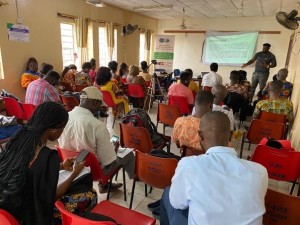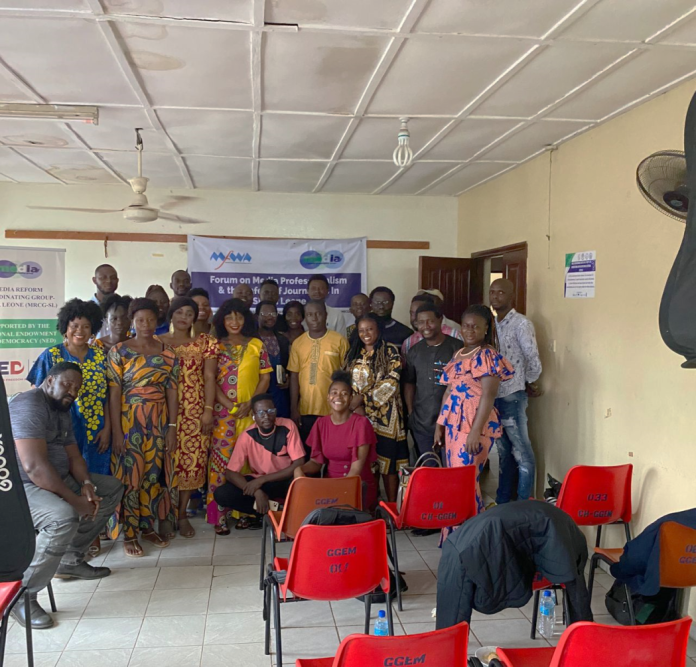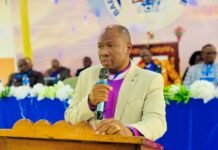By Foday Moriba Conteh
As part of their efforts towards achieving one of the recommendations in the report , “The Safety of Journalists in Sierra Leone: A Study on the State of Safety of Journalists’ Policies and Practices in Media Houses in Sierra Leone 2020”, the Media Reform Coordinating Group (MRCG), in partnership with Media Foundation for West Africa, with support from the Embassy of the Kingdom of the Netherlands in Ghana, has on Friday 19th May, 2023 held a one day training programme for selected journalists from various media houses on Media Professionalism & the Safety of Journalists in Sierra Leone. The one day training was held at GGEMS Hall on John Street in Freetown.
Giving a background and overview of the study, the National Coordinator of the Media Reform Coordinating Group, Dr. Francis Sowa said the report was commissioned by the Media Foundation for West Africa in 2020, adding that the study looked at whether there were policies that guarantee the safety of journalists and whether the practices manifest the reality as to whether there were safety and security for journalists in the country.
He maintained that the study examined the Safety of Journalists’ Policies and Practices in Media Houses in Sierra Leone’ taking into consideration forty-four media outlets spread across the country, stating that the key issues assessed are the trends of safety of journalists’ issues in Sierra Leone (including types of violations, perpetrators, gender of victims), number of media outlets that have safety policies or manuals, and number a specific policy for female journalists, what the practices are etc.
Dr. Francis Sowa revealed that according to the report findings it shows that majority of the media houses studied lack safety and security policies and there are no specific safety and security policies in those media institutions, although most of them stated that such issues are addressed in their editorial policies.
The National Coordinator concluded by highlighting the recommendations of the report which includes firstly that there was a need to develop a template of a Safety and Security Policy which the media institutions can use to develop their own, in accordance with their peculiar circumstances and needs, secondly that the Independent Media Commission (IMC) and the Sierra Leone Association of Journalists (SLAJ) should add and intensify issues of safety and security of journalists in the Media Code of Practice and the Code of Ethics, thirdly that massive training of journalists on safety and security is required and finally support for the monitoring and reporting of safety and security issues in the country would be imperative.
The Representative of the Sierra Leone Association of Journalists, Christian Conteh, commended the Media Reform Coordinating Group and partners for organizing such a training which he described as very important towards enhancing the safety and security of journalists in the country.
He said that MRCG has been complementing the work of SLAJ of which he said the Association is very grateful. He concluded by stating that SLAJ will continue to partner with MRGC in order to support the development of journalists in the country.
In her statement, the President for Women in the Media Sierra Leone, Madam Eastina Taylor, applauded MRCG and its partners for recognizing the urgency of this matter and joining forces to organize this Forum on Media Professionalism and the Safety of Journalists in the country.
She said that the media, as the watchdog and agenda-setter, plays a crucial role in holding duty-bearers accountable for upholding openness and accountability in governance and public services of which she added that, however, they must create an environment that allows journalists to work freely and safely, ensuring that their voices can be heard without fear or intimidation.
Madam Eastina Taylor maintained that they are of the strong belief that the training will address the pressing issues of media professionalism and the safety of journalists. She urged all present to have robust discussions, share best practices and experiences, with the goal of charting a path towards a more accountable, responsible, and secured media landscape in Sierra Leone.
She concluded by reaffirming their commitment to media professionalism and the safety of journalists and to collaboratively address the challenges journalists face, ensuring that the media remains a beacon of truth, accountability, and democracy in Sierra Leone.
One of the beneficiaries, Ishmael Koroma an Editor of Vindicator Newspaper, expressed appreciation to the Media Reform Coordinating Group and partners for training journalists on their safety and security.
He said that the training has equipped them as journalists to know the dos and don’ts that have to do with their safety.
Ishmael Koroma assured, on behalf of colleagues, that they will use the knowledge acquired during the training in their day to day activities as journalists in order to enhance their safety and security.
The opening ceremony followed by presentations on various topics which includes “Presentation of Findings on the Safety of Journalists in Sierra Leone: A Study on the State of Safety of Journalists’ Policies and Practices in Media Houses in Sierra Leone 2020” by the National Coordinator of the Media Reform Coordinating Group, Dr. Francis Sowa, Media and “Professionalism in Sierra Leone” Facilitated by Yeama Thompson, “Safety of Journalists in Sierra Leone” facilitated by Dr. Tonya Musa, Preparations with Journalists and Modalities for Journalists Covering Elections”, facilitated by Director of Communications at ECSL, Albert Massaquoi.
At the end of the presentations, journalists present had the opportunity to contribute towards the discussion and they were further divided into groups of which representatives from those groups had the opportunity to do presentations on their findings and recommendations towards the safety and security of journalists in the country.





